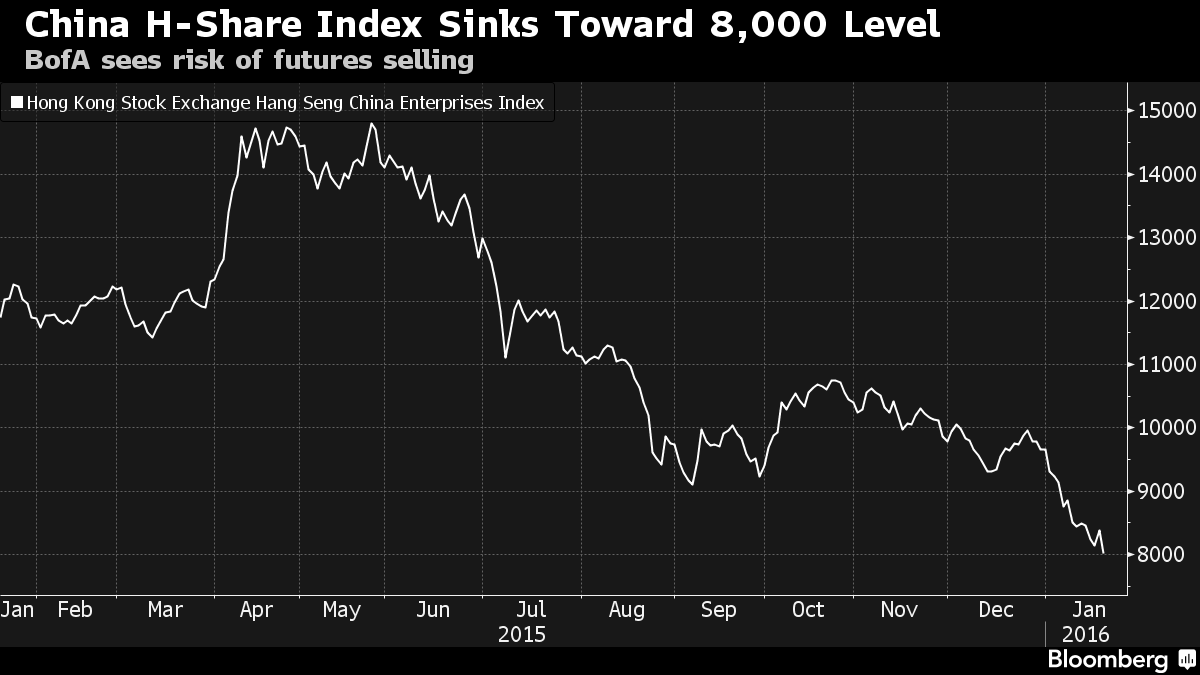Although we are not big fans of technical analyst Tom DeMark he said something today on Bloomberg that triggered some awareness sensitivity on our part. As quoted at ZeroHedge:
This naturally raised the question: why is he talking about Hong Kong and the H-shares?We are pretty confident the next level on the HSCEI is below 7,500. We think what we're going to see in the HSCEI is four consecutive, maybe five, lower closes and that should bottom that market. We should get down below 7,500 and the Shanghai Composite we should still get down to objective which is about 2,500-2,600.
File and forget.
Until seeing this by The Fly:
Bank of America: Derivative Triggers Might Annihilate the Hang Seng, Very Soon
This is a research note that was circulating today–that I didn’t get around to discussing–due to the face ripping market I was enjoying throughout the day.
The banks sold their clients structured products (God I hate that phrase) that gave them exposure to Chinese stocks traded in Hong Kong, aka “H-shares.” If you recall, everyone was sucking the skin off China’s knee caps just 1 year ago. Boy have circumstances changed.
Apparently, there is a “knock-in” feature that triggers if the H-shares fall below 8,000, with a notional value of $13.6 billion and another $16.8 billion between 6,000-7,000....MORE

Finally Bloomberg Hong Kong's Shery Ahn shows up in one of the feeds:
HSCEI 8,000 new key level! Already breached yesterday. Derivative trigger looms? #China https://t.co/8Gb8hld5Ib pic.twitter.com/xqj9xfgIC4
— Shery Ahn (@SheryAhnNews) January 21, 2016
And the linked story:
China Stock Rout Seen Getting Uglier as Derivative Trigger Looms
Updated on
If Bank of America Corp. is right, Chinese stocks in Hong Kong are poised for a fresh wave of selling.
That’s because the benchmark Hang Seng China Enterprises Index is approaching a level that forces investment banks to pare back their bullish futures positions, according to William Chan, the head of Asia Pacific equity derivatives research at BofA’s Merrill Lynch unit in Hong Kong. The trades, tied to banks’ issuance of structured products, are likely to start unwinding when the index falls through 8,000, a level it briefly breached on Wednesday. The gauge rose 1 percent to 8,096.26 at 9:40 a.m. on Thursday.
Banks have purchased futures on the gauge of so-called H shares to hedge exposure to structured products that they’ve sold to clients, according to Chan. Many of those products have a “knock-in” feature at the 8,000 level that will spur banks to cut futures positions to maintain the effectiveness of their hedges, he said. Additional pressure points may also come at lower levels, Chan said.